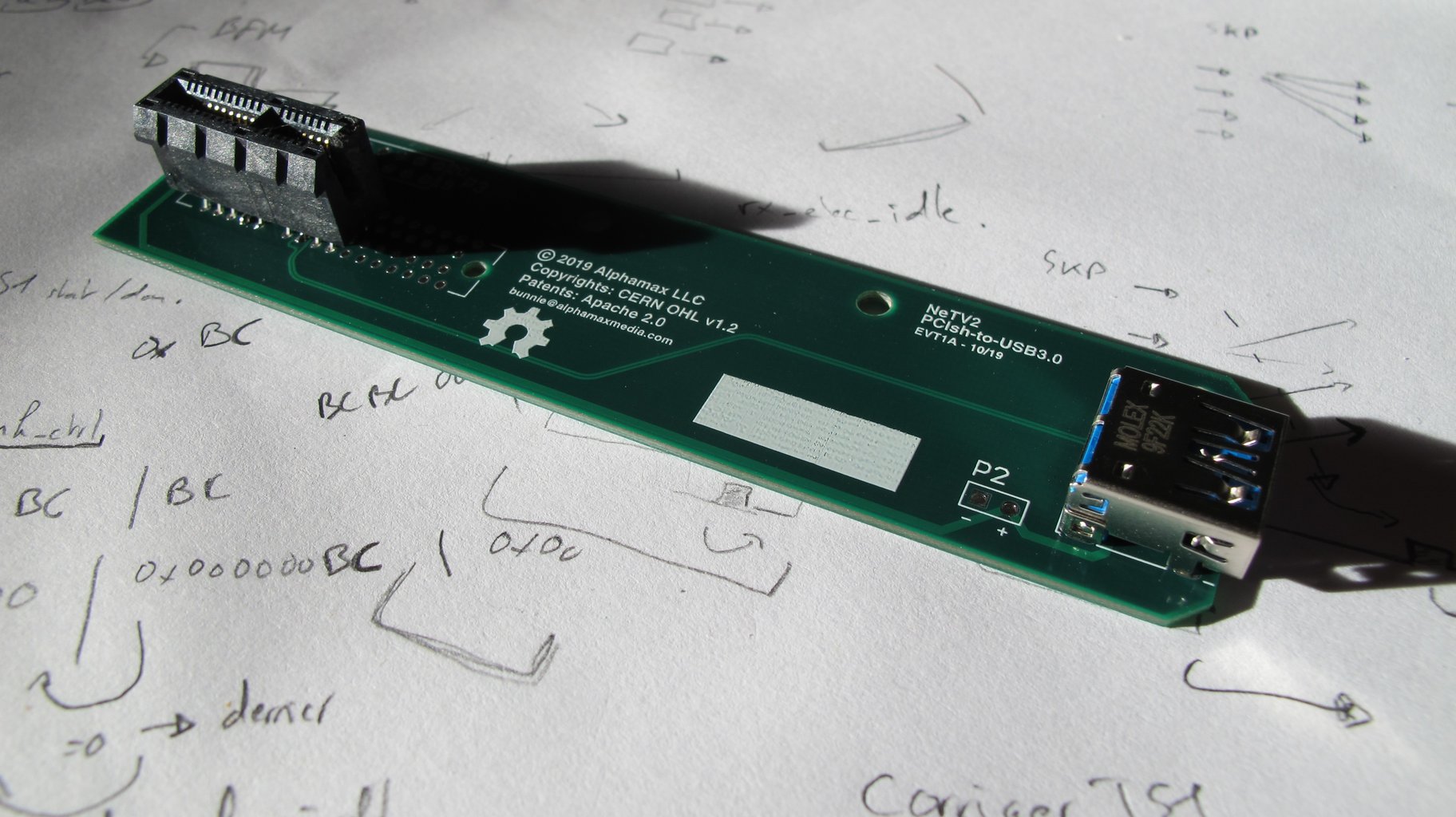__ _________ ____ ___ _______ ____
/ / / / __/ _ )|_ /___/ _ \/ _/ _ \/ __/
/ /_/ /\ \/ _ |/_ <___/ ___// // ___/ _/
\____/___/____/____/ /_/ /___/_/ /___/
Copyright (c) 2019, EnjoyDigital
Powered by Migen & LiteX
The aim of this project is to experiment with High Speed Transceivers (SERDES) of popular FPGAs to create a USB3.0 PIPE interface.
Current solutions for USB3 connectivity with an FPGA require the use of an external SerDes chip (TI TUSB1310A - SuperSpeed 5 Gbps USB 3.0 Transceiver with PIPE and ULPI Interfaces) or external FIFO chip (FTDI FT60X or Cypress FX3). With this project, we want to see if it's possible to just use the transceivers of the FPGA for the USB3 connectivity and have the USB3 PIPE directly implemented in the fabric (and then avoid any external chip!)
While we hope this wrapper will eventually support multiple protocols through the PIPE interface (such as PCIe, SATA, DisplayPort) it is currently targeting support for USB3.0 SuperSpeed when used with a customized Daisho USB3 core.
It currently targets Xilinx Kintex7, Artix7 and Lattice ECP5 FPGAs.
One of the following boards:
paired with the PCIsh-to-USB3.0 breakout board:
 (If you are interested in a breakout board, please ask)
(If you are interested in a breakout board, please ask)
This project targets;
- Xilinx Vivado for Kintex7 / Artix7 support
- Yosys + nextpnr for ECP5 support
There will also be a demo showing how to use a harness to expose the PIPE interface to the SymbiFlow Yosys + VPR flow.
$ sudo apt install build-essential wget git python3-setuptools
$ git clone ttps://github.com/enjoy-digital/usb3_pipe/
$ cd usb3_pipe$ wget https://raw.githubusercontent.com/enjoy-digital/litex/master/litex_setup.py
$ chmod +x litex_setup.py
$ sudo ./litex_setup.py init install$ sudo apt install verilator
$ sudo apt install libevent-dev libjson-c-dev$ ./sim.pyYou should see the USB3.0 initialization between a Host and Device:
[00000000] HOST entering Polling.LFPS state
[00000000] DEV entering Polling.LFPS state
[00000000] HOST entering Polling.LFPS state
[00000000] DEV entering Polling.LFPS state
[00026641] HOST entering Polling.RxEQ state
[00026641] DEV entering Polling.RxEQ state
[01075207] HOST entering Polling.Active state
[01075207] DEV entering Polling.Active state
[01075296] HOST entering Polling.Configuration state
[01075296] DEV entering Polling.Configuration state
[01075423] HOST entering Polling.Idle state
[01075423] DEV entering Polling.Idle state
At this point, all the steps of the USB3.0 PIPE initialization have succeeded and the USB3.0 Core can start transmitting packets.
To have a .vcd waveform of the simulation, run it with --trace:
$ ./sim.py --trace
$ gtkwave build/gateware/dut.vcdOnce installed, build the bitstream with:
$ ./target.py --build (can be kc705, netv2, pcie_screamer or versa_ecp5)- Plug the PCIsh-to-USB3.0 breakout board to the PCIe connector of the FPGA board.
- Connect the USB3.0 type A cable between the breakout board and the computer.
- Connect the JTAG programming cable to the FPGA board.
- Power on the hardware
To load the bitstream to you board, run:
$ ./target.py --loadOnce the FPGA is loaded, the link will be automatically established with the computer and an Openmoko, Inc USB3.0 device should be enumerated. Note: Enumeration has only been done on a few hardware setups and there is still work in progress to improve reliability.

